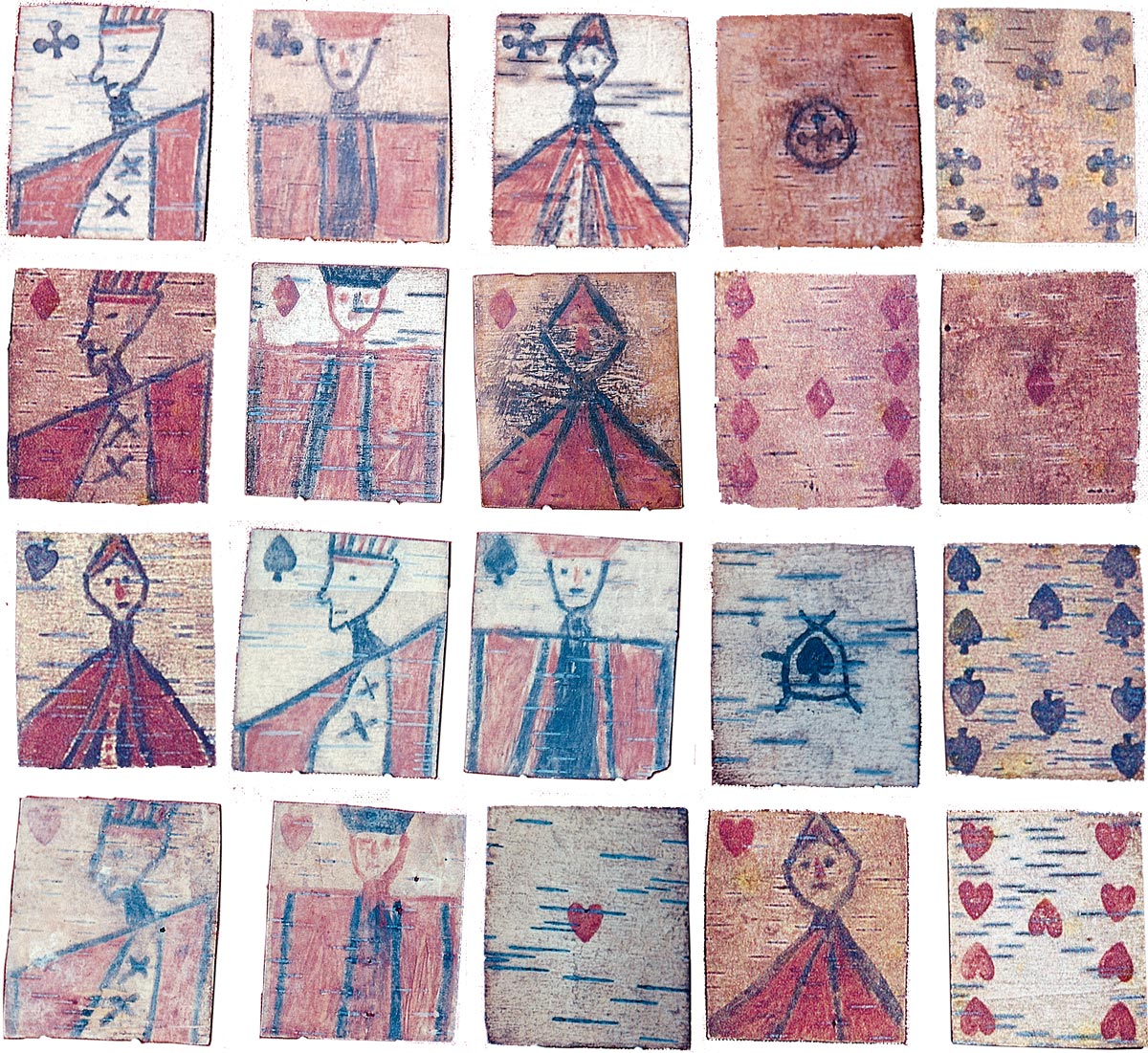Ojibwa Native Indian Cards
Ojibwa Native Indian playing cards hand manufactured on birch bark in imitation of standard French / English cards, c.1875.
Ojibwa Native Indian Playing Cards
While the playing cards of native American Indians were usually painted on rectangles of rawhide in imitation of Mexican or Spanish cards, these Ojibwa Native Indian playing cards are hand manufactured on birch bark in imitation of standard French / English cards. The Ojibwa peoples are historically known for their crafting of birch bark canoes, their sacred birch bark scrolls and the use of cowrie shells for trading [wikipedia]. As they were encountering French, English, Dutch, Swedish and American trappers, colonists and pioneers, who were using standard 52-card ‘Bridge’ packs, they imitated these cards using birch bark.
The birch bark rectangles are not always evenly trimmed with square corners. The cards follow the normal convention of two red suits and two black, with the symbols possibly being printed from blocks. The Jacks, Queens and Kings appear to have been hand painted with a narrow implement and coloured with red and black pigments. The courts are single-ended but the numeral cards are reversible. Whilst this material could be used for play, these cards show no signs of wear. They may possibly have been made as a curio for sale to travellers, but there are no surviving details of their exact provenance except that they were obtained by George Heye no later than 1917 and are reckoned to date from around 1875 or before.

Above: Ojibwa Native Indian playing cards hand manufactured on birch bark in imitation of standard French / English cards, prior to 1875. 52 cards. Photographs taken by Harold Wayland of cards in National Museum of the American Indian, Smithsonian Institution, Washington, D.C. (cat no.7/811).
REFERENCES
Wayland, Harold & Virginia, Ferg, Alan: American Indian Playing Cards of French and English Derivation, in ‘The Playing-card’, Journal of the IPCS, Vol.33 No.3, Jan-Mar 2005.

By Simon Wintle
Member since February 01, 1996
I am the founder of The World of Playing Cards (est. 1996), a website dedicated to the history, artistry and cultural significance of playing cards and tarot. Over the years I have researched various areas of the subject, acquired and traded collections and contributed as a committee member of the IPCS and graphics editor of The Playing-Card journal. Having lived in Chile, England, Wales, and now Spain, these experiences have shaped my work and passion for playing cards. Amongst my achievements is producing a limited-edition replica of a 17th-century English pack using woodblocks and stencils—a labour of love. Today, the World of Playing Cards is a global collaborative project, with my son Adam serving as the technical driving force behind its development. His innovative efforts have helped shape the site into the thriving hub it is today. You are warmly invited to become a contributor and share your enthusiasm.
Related Articles

Rap Rummy
Rap Rummy made by Parker Brothers in 1926, only 4 years after the discovery of King Tutankhamen’s to...

German Travel Cards
A travel-themed educational deck helping American tourists visiting Germany.

Can You Believe Your Eyes?
“Can You Believe Your Eyes?” playing cards featuring visual illusions & other oddities.

Visite Mexico
Promoting Mexican tourism with 54 different photographs in full colour.

Get Decked
Black and white cartoons devised by Sam Wagner with help from artist Lindsay Bevington.

Beowulf
Jackson Robinson's Beowulf playing card deck inspired by the Old English pagan poem.

Keith Haring playing cards
Energetic graffiti images by the American artist Keith Haring.

Mexican ethnic playing cards
Mexican ethnic groups depicted on playing cards by Fábrica de Naipes Cuauhtemoc.

The Tarot of Meditation – Yeager Tarot
Marty Yeager’s original Tarot of Meditation from 1975, republished later by U.S. Games Systems, Inc....

Adobe Deck
The first digitally-produced deck of cards.

Seminole Wars deck
Seminole Wars deck by J. Y. Humphreys, Philadelphia, c.1819.

The UCR Deck
Giant-size cards designed by Thomas Sanders to advertise courses and facilities at UCR.

Fredericks & Mae playing cards
A rainbow pack from the design team of Fredericks & Mae and Benjamin English.

Red Hat Society playing cards
Society that encourages women in their quest to get the most out of life.

Mountain Dream Tarot
Groundbreaking Tarot created by Bea Nettles, using photographs and photo montage.

Junior Playing Cards
Child-friendly versions of standard English pattern cards designed by Louie Mantia, Jr.
Most Popular
Our top articles from the past 28 days























